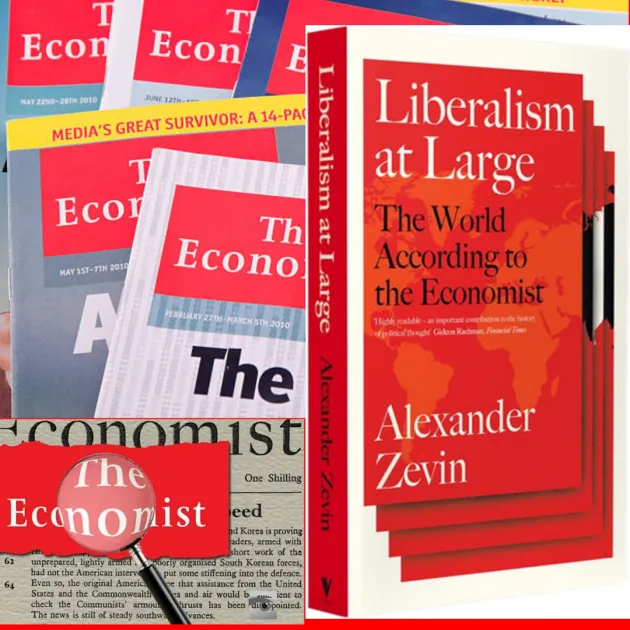Staff Pick: Liberalism at Large
Published on 29th February 2024
Liberalism at Large: The World According to the Economist by Alexander Zevin
While a history of The Economist may sound incredibly dry to most people, the magazine is, as Liberalism at Large author Alexander Zevin points out, widely read and very influential. Furthermore, Zevin argues, the magazine’s path has interweaved with the history of liberalism as a political philosophy. Understanding its history and underlying assumptions gives readers an insight into both the magazine and liberalism more generally.
This is an extremely well-researched book with an incredible amount of detail even excluding the endnotes. Rather than attempting to give a potted history of the magazine, I will summarise what Zevin presents as the three consistent themes of The Economist’s worldview: “the universal virtues of capital…the particular necessities of empire” and eventually “the will of the people” but only as long as that will didn’t get in the way.
Capital
To begin with capital, the magazine (or ‘newspaper’ as they refer to themselves) was started in 1843 as part of the movement against Britain’s Corn Laws. They argued strongly against tariffs and in favour of free trade. An early example of their commitment to free trade arose just a few years later. Zevin writes that during the Irish famine it looked like the British Government might provide Ireland with millions of pounds for food. The Economist was on hand to point out that “this would increase the price of grain, not the supply, causing hardship in England to alleviate it in Ireland”. Moreover, they helpfully explained, the only ways to deal with a lack of things to eat were to “procure more food or eat less”. Throughout the famine the magazine demanded that the principles of free trade be adhered to which meant, as Zevin notes, that “even as people scrounged for nettles [to eat], thousands of tons of wheat, oats, cattle, pigs, eggs and butter were sailing out of” Ireland. The reasoning behind the continued support for the export of goods was that the money from this trade could be used to buy cheaper food for people to eat. However, this was not what happened and instead millions of people died or emigrated.
Empire
To move to empire, interestingly, the magazine initially argued against war and empire as both inconsistent with free trade principles and costly. But once The Economist’s first editor, James Wilson, entered parliament as an MP, this element of their worldview was largely cast off. Early examples of this about-face were seen in the 1850s in their support for the Crimean War and the Second Opium War. Arguably more egregious than these examples was the Second Boer War which began in 1889. Although sceptical to begin, The Economist eventually got behind the war effort while assuring the world that the Boers would be treated better than a non-white opposing force would have been. As it happened, when reports of the use of concentration camps by the British emerged, the magazine made no comment.
Democracy
Thirdly, to democracy, which The Economist opposed entirely for its first three decades in existence. It subsequently fought a rear-guard action against any expansion of the franchise and, of course, against Home Rule in Ireland. With the onset of universal suffrage in Britain, the magazine’s focus shifted to ensuring that governments balanced their books and, to quote Zevin, that “‘sound finance’ must and would win out over democracy”. Overseas, however, democracy could still be fought. With the United States inheriting Britain’s mantle as the dominant western empire after the Second World War, The Economist supported the overturning of democratically-elected governments including those of Iran, Guatemala, Indonesia and Chile.

The book is full of staggering quotes from The Economist so it would perhaps be unfair to finish without allowing the magazine to speak for itself. For example, it regarded the British partition of India in 1947 as an “honourable and dignified conclusion to a chapter of history”. After the United States sent troops into the Dominican Republic in 1965, the magazine reminded readers that the U.S. was, after all, “the most internationally responsible country in the world”. When some in Britain had the temerity to question the United States invasion of Grenada (a member of the Commonwealth), The Economist cheerily reminded them that “superpowers do not need allies…only cheerleaders”.
Despite all of the above (or perhaps because of it), The Economist continues to be a popular magazine with a large circulation. Former contributor Daniel Singer once said that readers of the magazine do so in order to “hear the bourgeoisie talking to itself”. Alexander Zevin, for his part, regards the magazine as being superior to other similar publications because of its “political clarity, coherence and throw weight”.
Zevin also argues that the magazine and liberalism generally, have moulded our modern world — communism was defeated, liberal capitalism is dominant. This makes it all the more ironic that, since 2016, liberalism has sometimes felt like it has run its course, Zevin’s in-depth analysis shows that both the political philosophy itself and the magazine which champions it remain relevant and worthy of further study.
Submitted by Peadar, Pearse Street Library HQ.